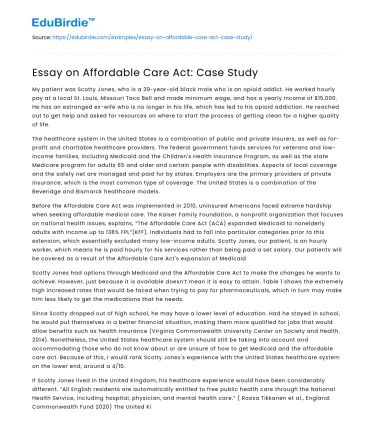My patient was Scotty Jones, who is a 39-year-old black male who is an opioid addict. He worked hourly pay at a local St. Louis, Missouri Taco Bell and made minimum wage, and has a yearly income of $15,000. He has an estranged ex-wife who is no longer in his life, which has led to his opioid addiction. He reached out to get help and asked for resources on where to start the process of getting clean for a higher quality of life.
The healthcare system in the United States is a combination of public and private insurers, as well as for-profit and charitable healthcare providers. The federal government funds services for veterans and low-income families, including Medicaid and the Children's Health Insurance Program, as well as the state Medicare program for adults 65 and older and certain people with disabilities. Aspects of local coverage and the safety net are managed and paid for by states. Employers are the primary providers of private insurance, which is the most common type of coverage. The United States is a combination of the Beveridge and Bismarck healthcare models.
Save your time!
We can take care of your essay
- Proper editing and formatting
- Free revision, title page, and bibliography
- Flexible prices and money-back guarantee
Before the Affordable Care Act was implemented in 2010, uninsured Americans faced extreme hardship when seeking affordable medical care. The Kaiser Family Foundation, a nonprofit organization that focuses on national health issues, explains, “The Affordable Care Act (ACA) expanded Medicaid to nonelderly adults with income up to 138% FPL”(KFF). Individuals had to fall into particular categories prior to this extension, which essentially excluded many low-income adults. Scotty Jones, our patient, is an hourly worker, which means he is paid hourly for his services rather than being paid a set salary. Our patients will be covered as a result of the Affordable Care Act's expansion of Medicaid.
Scotty Jones had options through Medicaid and the Affordable Care Act to make the changes he wants to achieve. However, just because it is available doesn’t mean it is easy to attain. Table 1 shows the extremely high increased rates that would be faced when trying to pay for pharmaceuticals, which in turn may make him less likely to get the medications that he needs.
Since Scotty dropped out of high school, he may have a lower level of education. Had he stayed in school, he would put themselves in a better financial situation, making them more qualified for jobs that would allow benefits such as health insurance (Virginia Commonwealth University Center on Society and Health, 2014). Nonetheless, the United States healthcare system should still be taking into account and accommodating those who do not know about or are unsure of how to get Medicaid and the affordable care act. Because of this, I would rank Scotty Jones's experience with the United States healthcare system on the lower end, around a 4/10.
If Scotty Jones lived in the United Kingdom, his healthcare experience would have been considerably different. “All English residents are automatically entitled to free public health care through the National Health Service, including hospital, physician, and mental health care.” ( Roosa Tikkanen et al., England: Commonwealth Fund 2020) The United Kingdom uses the Beveridge model. William Beveridge first developed the Beveridge Model in 1948. This model, which originated in the United Kingdom and has since spread to most of Northern Europe and the rest of the world, is frequently centralized through the creation of a national health service. The government operates as a single-payer system, removing market competition and holding prices low. Since health insurance is funded by income taxes, it is free at the point of treatment, and the patient does not have to pay any out-of-pocket costs after an appointment or procedure because of their tax payment. A substantial portion of the healthcare workforce of this system is made up of government employees. Health as a human right is a fundamental tenet of this model.
Since all residents automatically get healthcare in the UK, Scotty Jones would not have to get Medicaid through the affordable care act. Scotty Jones would have free public healthcare, funded by his taxes. This would include preventative screenings, inpatient and out-of-patient care, physician services, and more. Since physician visits are covered, Scotty may have been more likely to go to visit the doctor, who could potentially point him in the right direction of getting help for his opioid addiction. For this reason, I believe Scotty Jones may have more success in aiding his opioid addiction, and I would rate his experience a 7/10.
If Scotty Jones resided in Japan, his healthcare experiences would be affected. Japan uses the Bismarck model. Otto von Bismarck developed the Bismarck model, a more decentralized type of healthcare, near the end of the 19th century. In this model, healthcare is funded by both employers and employees.






 Stuck on your essay?
Stuck on your essay?

